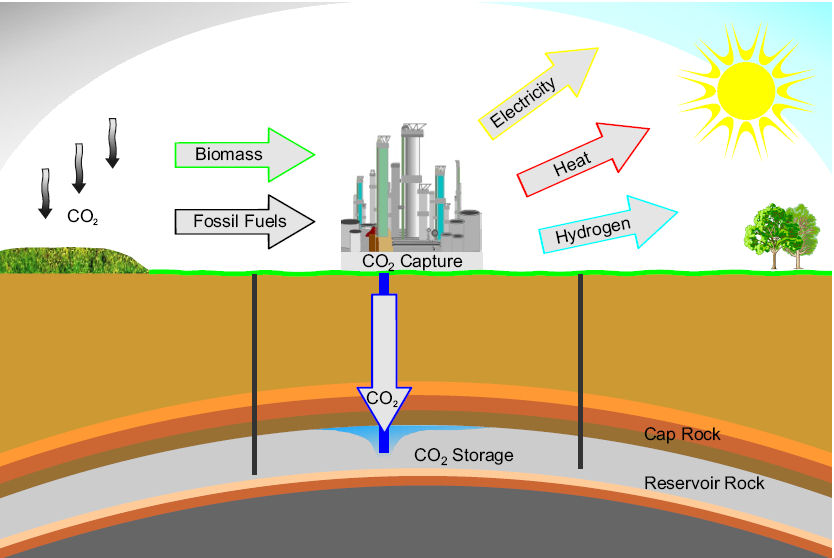| « True Innovation Requires Fascism? | ESG Scoring, What You Need to Know, And What It is? » |
Carbon Capture and Storage, The Carbon Pipeline From Hell
SIOUX FALLS, S.D. -- Two companies seeking to build thousands of miles of pipeline across the Midwest are promising the effort will aid rather than hinder the fight against climate change, though some environmental groups remain skeptical.
The pipelines would stretch from North Dakota to Illinois, potentially transforming the Corn Belt into one of the world’s largest corridors for a technology called carbon capture and storage.
Environmental activists and landowners have hindered other proposed pipelines in the region that pump oil, carrying carbon that was buried in the earth to engines or plants where it is burned and emitted. The new projects would essentially do the opposite by capturing carbon dioxide at ethanol refineries and transporting it to sites where it could be buried thousands of feet underground.
Despite concerns from Raffensperger and others about potential leaks from the pipelines or storage sites, the Environmental Protection Agency has concluded that storing carbon dioxide is safe as long as companies do it carefully. It is injected in a liquefied state into porous rock formations, where it eventually dissolves or hardens into minerals.
While this all sounds plausible, and more like a "possible solution" to the problem that environmentalists claim exists. There's another problem. How to capture the carbon? Elon Musk helped with that effort, by investing in a competition.
On Wednesday, Stieghorst and her Accelerated Carbonate Ion Dissolution and Dispersal (ACIDD) student team members—Isabella Arosemena, Zach Berkowitz, Jeanette Betke, Isabelle Fitzpatrick, Anwar Khan, Eden Leder, Nancy Lewis, and Drew Rich—learned their work had paid off. XPRIZE announced that ACIDD is one of five student projects awarded $100,000 to advance Musk’s goal of removing 1 billion tons of CO₂ per year from the atmosphere.
Now, Stieghorst, who is graduating in December with a degree in ecosystems science and policy, acknowledges that the hard work really begins. “I am over the moon,” she said. “I had so much confidence in the solution that I imagined this happening. But everything we did was theoretical. So, now we have to prove the idea works in the real world and at scale.”
The ACIDD proposal was based on a process developed by Rau, the chief technology officer and co-founder of Planetary Hydrogen, a carbon-capture startup. The process generates a low-carbon form of alkalinity using waste products from mining, water, and renewable electricity, and harvesting valuable byproducts such as hydrogen—a key ingredient to a decarbonized energy system. When added to the ocean, the alkalinity enhances the ocean’s uptake of CO₂ from the air while countering local ocean acidification.
“Essentially, it’s like one big Alka Seltzer,” Stieghorst said. “When the tablet dissolves in water, it can neutralize acid. Distributing this liquid in the ocean will have a similar effect—and speed up a natural part of the geologic carbon cycle that takes thousands of years. Accelerating it to human-time scales can safely lock away our anthropogenic carbon emissions for more than 100,000 years.”
The partnership is one that Langdon, who studies the biology and ecology of corals, said could expand important research in the future. “Corals are a super delicate organism,” he said. “If we can show that we can add the Planetary Hydrogen product to the water and it doesn’t injure the health of the corals—or even enhances their health—that could go a long way in convincing people that a larger-scale experiment would be safe to try.”
This couldn't possibly go wrong right? One group wants to bury the CO2 in the ground, the other group wants to create a solid CO2 substance and dump it in the ocean.
Pumping the CO2 in the ground doesn't sound so bad, until you find out where they want to do it. The result is "transforming the Corn Belt into one of the world’s largest corridors for a technology called carbon capture and storage." Is it will destroy/repurpose farmland to capture carbon? Reducing the countries ability to produce corn doesn't sound like a good idea to me. We're immigrating people at an alarming rate, and those people have to eat. Repurposing crucial farmland to capture carbon sounds unwise.
Then, you have to consider who owns a lot of this land.
Bill Gates has never been a farmer. So why did the Land Report dub him “Farmer Bill” this year? The third richest man on the planet doesn’t have a green thumb. Nor does he put in the back-breaking labor humble people do to grow our food and who get far less praise for it. That kind of hard work isn’t what made him rich. Gates’ achievement, according to the report, is that he’s largest private owner of farmland in the US. A 2018 purchase of 14,500 acres of prime eastern Washington farmland – which is traditional Yakama territory – for $171m helped him get that title.
In total, Gates owns approximately 242,000 acres of farmland with assets totaling more than $690m. To put that into perspective, that’s nearly the size of Hong Kong and twice the acreage of the Lower Brule Sioux Tribe, where I’m an enrolled member. A white man owns more farmland than my entire Native nation!
When pressed during a book discussion on Reddit about why he’s gobbling up so much farmland, Gates claimed, “It is not connected to climate [change].” The decision, he said, came from his “investment group.” Cascade Investment, the firm making these acquisitions, is controlled by Gates. And the firm said it’s “very supportive of sustainable farming”. It also is a shareholder in the plant-based protein companies Beyond Meat and Impossible Foods as well as the farming equipment manufacturer John Deere. His firm’s largest farmland acquisition happened in 2017, when it acquired 61 farming properties from a Canadian investment firm to the tune of $500m.
Why would Gates come out and say, “It is not connected to climate change.” It tells me that Gates is concerned that people think he might be purchasing land because of climate change. This tells me that -- Gates is purchasing land for a climate change related project. I believe it's because of the carbon capture technology. Gates wants to own the land they are going to build on.
It's nearly impossible now to find any of the stories about high-speed rail in Florida. That was a similar story. The man who proposed and lobbied for the high-speed rail system owned around 80% of the land it was to be built on. Land that was otherwise very low value, could be sold for much more to the government -- for high speed rail.
I have no doubt that Gates is eyeing the exact same thing here.
Then you have the solid CO2 substance idea. Dumping the CO2 into the ocean. The logistics of this method are mind boggling. There are many facets to this. First they will have to determine how much of the CO2 slurry they can dump in a particular area, before it changes the PH of the water enough to kill wildlife. And the tides will effect the volume of water in a given area while causing a change in currents, so there's a timing aspect to it as well. Then once the ecological impact is determined, they can actually attempt to engineer a system to distribute it. Because dumping it from ships wouldn't be very "carbon neutral."
However, this is all based on the idea that carbon dioxide in the air is going to destroy our environment, is it? What evidence do we have other than the hockey stick chart, which was comprised of falsified data, and politicians who are pushing this idea.
Update 04-25-24:
Existing plants will get a little bit of a break, but new plants will have to meet the new requirements immediately.
The power plant rule marks the first time the federal government has restricted carbon dioxide emissions from existing coal-fired power plants. The rule also would force future electric plants fueled by coal or gas to control up to 90% of their carbon pollution. The new standards will avoid 1.38 billion metric tons of carbon pollution through 2047, equivalent to the annual emissions of 328 million gas cars, the EPA said, and will provide hundreds of billions of dollars in climate and health benefits, measured in fewer premature deaths, asthma cases and lost work or school days.
...
Rich Nolan, president and CEO of the National Mining Association, said that through the latest rules, “the EPA is systematically dismantling the reliability of the U.S. electric grid.’'
He accused Biden, Regan and other officials of “ignoring our energy reality and forcing the closure of well-operating coal plants that repeatedly come to the rescue during times of peak demand. The repercussions of this reckless plan will be felt across the country by all Americans.”
...
Dan Brouillette, president and CEO of of the Edison Electric Institute, which represents U.S. investor-owned electric companies, said he was “disappointed” that the EPA “did not address the concerns we raised about carbon capture and storage.’' While promising, the technology “is not yet ready for full-scale, economy-wide deployment,’' said Brouillette, who served as energy secretary in President Donald Trump’s administration.
What do you think?
Please leave a comment, like it or hate it... You DO NOT need to register to leave a comment. Email addresses are NOT used. Just make one up "someone@somehost.com"

